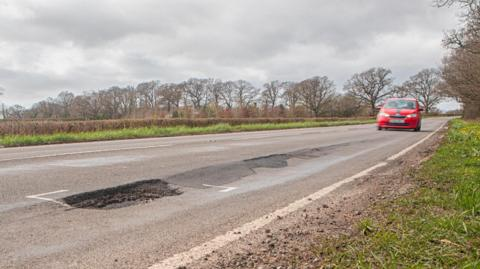In Cornwall, England, a local driver decided to take action after months of government inaction left a major pothole making the road nearly impassable. Frustrated by delays, they took matters into their own hands, filling the pothole themselves to restore access. Instead of appreciation, their efforts were met with criticism from officials and the private company responsible for road maintenance.
This incident has sparked a larger debate about public infrastructure and whether citizens should intervene when government agencies fail to act.
The Pothole That Pushed a Driver to Act

For months, residents of Tanhouse Road in Cornwall had been dealing with worsening road conditions. The road had been officially closed since April due to drainage issues, but no repairs had been made. Each passing day, the pothole grew larger, creating safety risks for both motorists and pedestrians.
Despite repeated promises from Cornwall Highways and Cormac, the private company responsible for maintaining the roads, there was no visible progress. For many locals, the situation became a symbol of bureaucracy at its worst. While officials discussed possible solutions, nothing actually got done.
Finally, one frustrated driver decided to take direct action. Armed with cement, they filled the pothole themselves, making the road functional again. What seemed like a practical solution quickly turned into a controversy that divided public opinion.
Authorities Condemn the DIY Road Repair
While many residents applauded the driver for taking initiative, local officials had a very different reaction. Cornwall Highways and Cormac condemned the repair, arguing that unauthorized fixes could compromise future roadwork. They warned that improper repairs could lead to structural issues and potential safety hazards.
Officials also pointed out that road maintenance requires professional expertise. They claimed that if the unauthorized repair failed and caused an accident, there could be serious legal consequences. Authorities even launched an investigation to identify the person responsible, making it clear that such actions were unacceptable.
This situation raises an important question—if officials had repaired the road on time, would this even have happened?
When Citizens Take Infrastructure Into Their Own Hands
The Cornwall incident is not an isolated case. Around the world, frustrated citizens have stepped in when government inaction left public infrastructure in disrepair.
In Toronto, Canada, a resident built a set of park stairs after the city delayed the project for years and estimated it would cost tens of thousands of dollars. His DIY solution cost a fraction of the official estimate.
In the United States, communities have taken it upon themselves to fill potholes, repaint crosswalks, and clean up neglected public spaces after facing long government delays.
Similar cases have emerged across the United Kingdom and Europe, where citizens, fed up with slow-moving bureaucracies, have repaired roads, installed safety features, or refurbished public areas without official approval.
While these actions highlight inefficiencies in public infrastructure management, they also raise legal and safety concerns. Government officials argue that roads, bridges, and other public assets need professional maintenance to ensure long-term durability and compliance with safety standards.
Arguments for Citizen-Led Repairs

Supporters of DIY repairs argue that when governments fail to act, people have no choice but to take matters into their own hands. They believe that public safety should take priority over bureaucratic procedures.
Bureaucratic delays often waste time and taxpayer money. Public works projects frequently get stuck in red tape, leading to excessive costs and unnecessary hold-ups.
Immediate solutions can prevent accidents. A pothole left unattended for months can lead to vehicle damage, accidents, and injuries. Even a temporary fix can reduce the risks.
Taxpayers deserve better service. People pay taxes for road maintenance, yet they often see little action. When government agencies fail, it is understandable why some residents feel the need to intervene.
For many, these DIY repairs are not about defying authority but about addressing urgent problems. If officials were more responsive, residents would not feel compelled to take action themselves.
Arguments Against Unauthorized Fixes

On the other hand, road maintenance experts and government officials stress that infrastructure repairs require specialized knowledge and proper planning.
Safety concerns are a major issue. Poorly done roadwork can create new hazards. If an unauthorized fix fails and leads to an accident, who is responsible?
Quick fixes might not last. While a DIY repair may seem effective in the short term, improper materials or techniques can cause further damage down the road.
Unapproved repairs can interfere with long-term maintenance. If professionals need to undo an amateur repair before fixing the road properly, it could delay the process even further.
Authorities argue that while frustrations are valid, there are better ways to push for action. Filing complaints, attending council meetings, and putting pressure on government agencies are seen as the proper channels to demand improvements. However, when a road remains unusable for months with no response, is waiting really an option?
What Happens Next for Cornwall?
Now that the pothole has been filled, the big question is what comes next. Will this act of defiance push Cornwall officials to take infrastructure issues more seriously, or will it simply result in penalties for the person responsible?
Cornwall Highways insists that an official repair is in progress, but locals remain skeptical. Months of inaction led to this situation in the first place, and many wonder whether they will see a proper fix anytime soon.
This situation highlights a much bigger issue—when government agencies fail to act, should citizens step in? And if public works projects were handled more efficiently, would people feel the need to intervene in the first place?
As frustration over infrastructure delays continues to grow worldwide, officials may soon have a much bigger problem than just one pothole in Cornwall.


